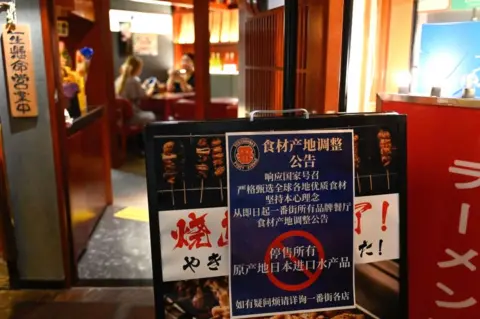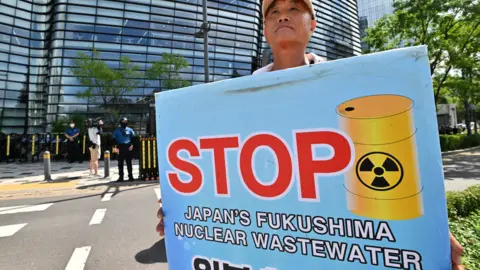Fukushima: China's anger at Japan is fuelled by disinformation
 Getty Images
Getty ImagesRocks thrown at schools, threats of a boycott and hundreds of hostile phone calls - these are just some of the ways Chinese people have shown their displeasure with Japan in recent weeks.
The catalyst? Japan's release of treated waste water from the damaged Fukushima nuclear plant into the sea.
Scientists largely agree that the impact will be negligible, but China has strongly protested the release.
And disinformation has only fuelled fear and suspicion in China.
A report by a UK-based data analysis company called Logically, which aims to fight misinformation, claims that since January, the Chinese government and state media have been running a coordinated disinformation campaign targeting the release of the waste water.
As part of this, mainstream news outlets in China have continually questioned the science behind the nuclear waste water discharge.
The rhetoric has only increased since the water was released on 24 August, stoking public anger.
In recent days, a rock was thrown at a Japanese children's school in Qingdao, while another school in Shandong had several eggs hurled into its compound. A brick was also thrown at the Japanese embassy in Beijing this week.
While there have been no reports of Japanese nationals in China being hurt, or companies being damaged, Tokyo has demanded that Beijing ensures the safety of its citizens.
Japan's foreign ministry even warned its citizens in China to be cautious and to avoid speaking Japanese loudly in public.
"China always protects the safety and legitimate rights and interests of foreigners in China, in accordance with law," China's foreign ministry spokesperson Wang Wenbin said in response to the demand, insisting that Beijing has considered the "so-called concerns of the Japanese side".
 Reuters
ReutersLogically's data also showed that, since the beginning of the year, state-owned media have run paid ads on Facebook and Instagram, without disclaimers, about the risks of the waste water release in multiple countries and languages, including English, German, and Khmer.
"It is quite evident that this is politically motivated," Hamsini Hariharan, a China expert at Logically, told the BBC. She added that misleading content from sources related to the Chinese government had intensified the public outcry.
"This isn't about food safety, China itself has had a lot of scandals regarding food safety. The Chinese narrative has often been positioning itself as an 'alternate leader' in the world order, and that the US and its allies propagate an unequal world order," she noted.
Dozens of posts on Chinese social media Weibo showed panicked crowds buying giant sacks of salt ahead of the Fukushima water release. Some worried that future supply would be contaminated. Others believed - falsely - that salt protected them against radiation.
A restaurant in Shanghai, in an apparent effort to profit off the hysteria, advertised "anti-radiation" meals with errant claims of reducing skin damage and cell regeneration. A social media user asked wryly, "Why would I pay 28 yuan for tomato with seasoning?"
Still others online have criticised the Fukushima discharge itself. They also mocked Japan's campaign to prove the safety of its seafood, which includes a video of Prime Minister Fumio Kishida eating what he called "delicious" raw fish.
Some compared notes about which Japanese cosmetic products to avoid. One user posted a screenshot of her returning products from Shiseido, Japan's leading cosmetic brand. "Don't buy, don't buy, return them all!" she said.
In response, a Shiseido spokesman said the company does not use seawater in its cosmetics.
The anger has also reached Japan's shores. Local businesses from Tokyo to Fukushima have complained about receiving a flurry of abusive phone calls from numbers with Chinese dialling codes since last Thursday.
Japan's economy is also expected to take a hit. As soon as the water was discharged, China - Japan's biggest buyer of seafood - banned all aquatic imports from the country.
Mr Kishida responded with a rescue package to help Japan's fish industry, including measures to increase domestic consumption and find new overseas markets.
Tokyo also hinted this week that it may file a complaint with the World Trade Organization over the ban. Japanese media also reported that Mr Kishida has asked Toshihiro Nikai, widely seen as the most pro-China lawmaker in his governing Liberal Democratic Party, to visit China to resolve the issue.
Relations between Beijing and Tokyo have been bitter since Japan's invasion of China in the early 1900s. More recent developments have not helped either, as an assertive Beijing clashes with US allies in the region, including Japan.
In 2012, swarms of violent protesters across China targeted Japanese businesses over a maritime territorial dispute between the two countries.
 Getty Images
Getty ImagesThis month, to Beijing's ire, Japan released a joint statement with the US and South Korea, denouncing what they called China's "dangerous and aggressive behaviour" in the region.
China's anger over the Fukushima water release has persisted despite approval by the UN's nuclear watchdog.
In July, International Atomic Energy Agency (IAEA) approved Japan's plan - announced two years ago, provoking uproar across Asia - concluding that the impact on people and the environment would be negligible.
Over the next 30 years, some 1.34 million tonnes of treated water - enough to fill 500 Olympic-size pools - will be released into the Pacific. It has accumulated since the 2011 tsunami destroyed the Fukushima plant, causing a nuclear meltdown.
But Beijing called the plan reckless and accused Tokyo of treating the sea like its "private sewer".
The Japanese public too has been divided over the issue. And other neighbours have also voiced concerns, including Hong Kong and South Korea who have imposed a ban on seafood from the waters around Fukushima. There have been protests in Seoul but the government has said it backs the discharge, and has sought to debunk fake claims that have gone viral on social media.
Meanwhile, opinions are also split in the scientific community. Some said the level of radiation is too low to pose any danger, but others have said more studies need to be done.
Additional reporting by Kelly Ng
